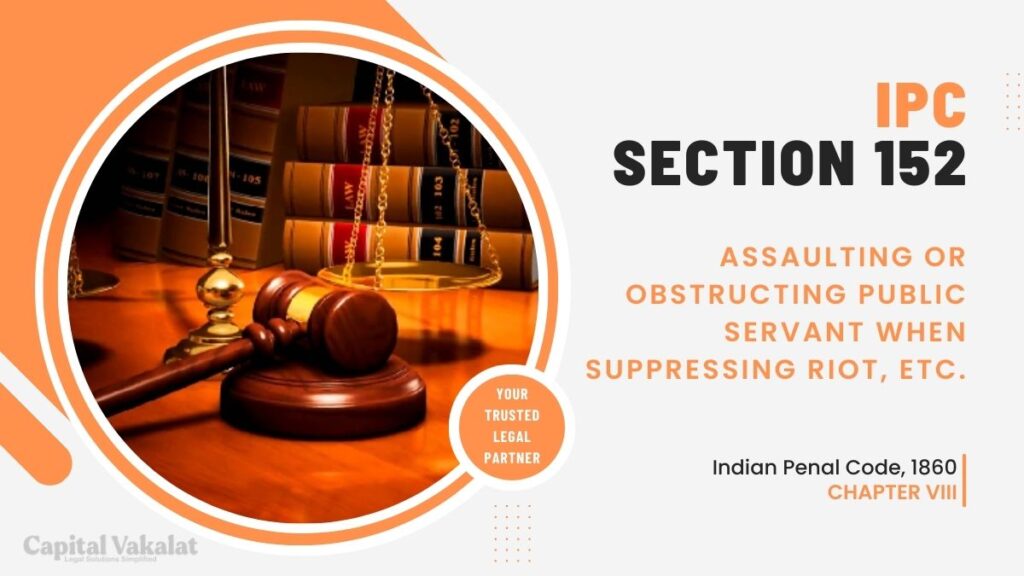Section 152 of the Indian Penal Code (IPC) is a critical legal provision that deals with offenses related to assaulting or obstructing a public servant while they are engaged in the suppression of a riot or similar public disturbances.

This article will provide a comprehensive understanding of this section, discussing its legal framework, who qualifies as a public servant, the role of public servants in riot control, and much more. Let’s dive into the intricacies of Section 152 IPC.
Introduction to Section 152 of the IPC
Section 152 of the IPC is a legal provision aimed at safeguarding public servants who are performing their duties during times of public unrest. It addresses the issue of obstructing or assaulting a public servant engaged in maintaining public order, such as during a riot or similar disturbances. To comprehend this section fully, it’s essential to understand its legal framework.
Understanding the Legal Framework
Section 152 IPC operates within the broader framework of Indian criminal law. It seeks to strike a balance between individual rights and the government’s duty to maintain public order. This section is particularly relevant when public servants are required to take action during protests, riots, or other public events that have the potential to escalate.
Who Qualifies as a Public Servant?
To invoke Section 152, it’s vital to define who qualifies as a public servant. In the context of this section, public servants include police officers, government officials, and other individuals responsible for enforcing the law or maintaining public order. Understanding the role of these public servants in controlling riots is crucial.
The Role of Public Servants in Riot Control
Public servants play a critical role in managing and controlling riots to prevent loss of life and property damage. They are tasked with maintaining peace and ensuring that citizens’ rights are protected, even in tumultuous situations. However, in the course of their duties, they can face various challenges.
Offenses Under Section 152 IPC
Section 152 IPC outlines specific offenses that can occur when a public servant is assaulted or obstructed while suppressing a riot. These offenses are taken seriously by the legal system as they threaten public order and the safety of both the public servant and the general public.
Elements of Assaulting or Obstructing a Public Servant
To be charged under Section 152, certain elements must be present. This includes an intentional act that obstructs or assaults a public servant, knowledge that the person is a public servant, and the act taking place while the public servant is discharging their duties during a riot or similar situation.
Distinction Between Rioting and Protesting
It’s essential to distinguish between rioting and peaceful protests. Section 152 IPC is invoked in cases of riots, not during lawful protests. Rioting involves violent and unlawful behavior, whereas protesting is a legitimate expression of one’s views, protected under the Indian Constitution.
Penalties for Offenses Under Section 152
The penalties for offenses under Section 152 IPC can vary based on the severity of the act. It’s crucial to understand the potential consequences of obstructing or assaulting a public servant during a riot.
Notable Legal Cases
This section discusses some notable legal cases that have revolved around Section 152 IPC. These cases provide insights into the practical application of the law and the court’s interpretations.
Rights and Defenses of the Accused
Individuals accused of offenses under Section 152 IPC have certain legal rights and defenses available to them. It’s important to know these rights to ensure a fair legal process.
The Importance of Preserving Public Order
Maintaining public order is a fundamental duty of any government. This section explores the importance of preserving public order and the role of Section 152 in achieving this objective.
Controversies and Criticisms
Like many legal provisions, Section 152 IPC has faced controversies and criticisms. This section delves into some of the criticisms and debates surrounding the use of this section.
Amendments to Section 152 IPC
Law evolves with time. This section examines any amendments made to Section 152 IPC and their implications on its application.
Recent Developments in the Interpretation of the Law
The legal landscape is constantly changing. This section highlights any recent developments in the interpretation and application of Section 152 IPC.
Conclusion
In conclusion, Section 152 of the IPC is a critical legal provision that addresses offenses related to assaulting or obstructing a public servant during the suppression of a riot. It plays a pivotal role in maintaining public order and protecting the safety of both public servants and citizens.
Frequently Asked Questions
What are the potential penalties for assaulting a public servant during a riot?
Penalties under Section 152 IPC can vary depending on the severity of the act, but they can include imprisonment and fines.
Can a public servant use force in response to an assault while suppressing a riot?
Public servants are allowed to use force as necessary to maintain public order, but it must be proportionate and within the bounds of the law.
Are there any specific legal defenses for individuals accused under Section 152 IPC?
Accused individuals can employ legal defenses such as self-defense or lack of intent, depending on the circumstances.
How has Section 152 IPC evolved over the years to adapt to changing societal norms?
Section 152 IPC has seen amendments to address contemporary challenges and to uphold the principles of justice and public order.